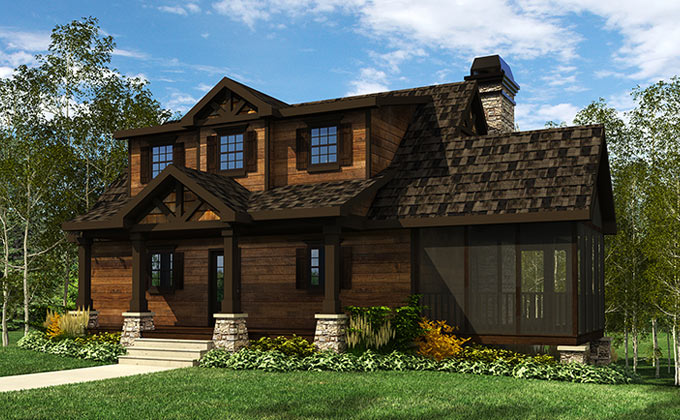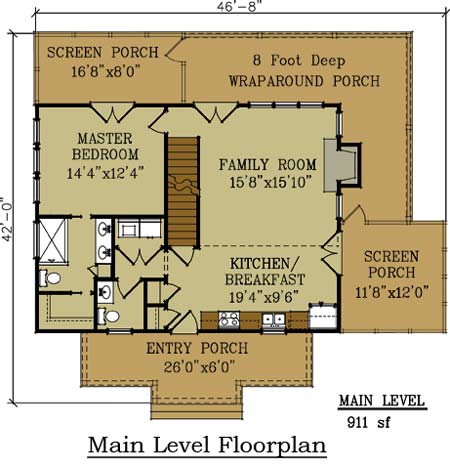

Main Floor:
913 sq. ftUpper Floor:
498 sq. ftLower Floor:
902 sq. ftHeated Area:
1,411 Sq. Ft.Width:
46'8Depth:
42'Bedrooms:
3Bathrooms:
3 1/2Stories:
3Additional Rooms:
Loft, Bunk Room, Flex Room, Game RoomGarage:
NoneOutdoor Spaces:
Wraparound Porch, Screened Porch, PatioOther:
Open FloorplanRoof:
11'2Exterior Framing:
2x4 or 2x6Ceiling Height:
9'Home Style:
Cottage, Rustic, CraftsmanLot Style:
Narrow Lot, Sloping LotThe Acadia Mountain Cottage is a cottage style house plan with a wraparound porch. It is just the right size and makes a great second home but it lives large enough to be a full time residence. This home is similar to our Little River Cabin but it includes an optional basement that can be finished to include a recreation room, two bunk rooms, and a full bath. The small footprint of the cabin makes it affordable. The open layout and wraparound porches make this small home live large. The kitchen, dining area, and family room are all part of one open vaulted space. The family room has a stone fireplace and access to the wraparound porches that enjoy views on two sides of the house. The master suite has a large vanity big enough for one or two sinks. The master bath is laid out so that you can include a walk in shower or a soaking tub and separate smaller shower. A half bath, pantry, and laundry closet complete the main level.The upper level includes a spacious bedroom, a private bath, and a loft open to the family room below. The area above the family room can be floored to add a third bedroom.The exterior of the Acadia Mountain Cottage is a mixture of stone and board and batten siding. The screened porch and wraparound porch connect you with the outdoors. The wraparound porch gives you the ability to rotate the house on the site in different ways to take maximum advantage of the views.

Each set of plans includes:







Notes:
All sales on house plans and customization/modifications are final. No refunds or exchanges can be given once your order has started the fulfillment process. All house plans from maxhouseplans are designed to conform to the local codes when and where the original house was constructed. In addition to the house plans you order, you may also need a site plan that shows where the house is going to be located on the property. You might also need beams sized to accommodate roof loads specific to your region. Your home builder can usually help you with this. Many areas now have area-specific energy codes that also have to be followed. This normally involves filling out a simple form providing documentation that your house plans are in compliance. In some regions, there is a second step you will need to take to insure your house plans are in compliance with local codes. Some areas of North America have very strict engineering requirements. New York, New Jersey, Nevada, and parts of Illinois require review by a local professional as well as some other areas. If you are building in these areas, it is most likely you will need to hire a state licensed structural engineer to analyze the design and provide additional drawings and calculations required by your building department. If you aren’t sure, building departments typically have a handout they will give you listing all of the items they require to submit for and obtain a building permit. Additionally, stock plans do not have a professional stamp attached. If your building department requires one, they will only accept a stamp from a professional licensed in the state where you plan to build. In this case, you will need to take your house plans to a local engineer or architect for review and stamping.